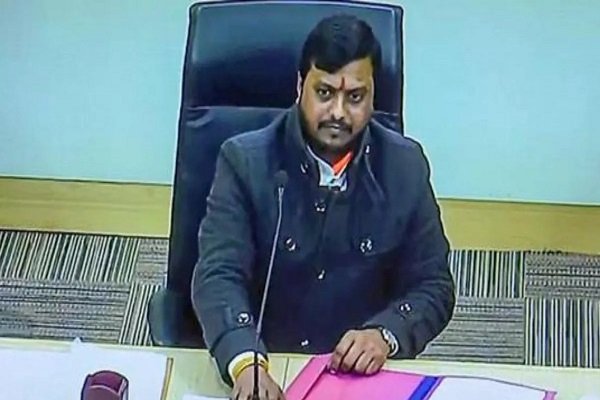In a dramatic turn of events, Chandigarh Mayor Manoj Sonkar has tendered his resignation ahead of a crucial Supreme Court hearing scheduled for Monday. This decision comes amidst mounting pressure for his dismissal and widespread protests led by opposition parties. The controversy stems from allegations of election rigging following the Bharatiya Janata Party’s (BJP) sweeping victory in the Chandigarh mayoral polls held on January 30.
Sonkar emerged victorious in the mayoral elections after securing 16 votes, defeating his closest rival, AAP leader Kuldeep Kumar, who managed to garner only 12 votes. Additionally, eight votes were declared invalid, adding to the contentious nature of the election outcome. However, the victory was soon overshadowed by allegations of malpractice and irregularities leveled by the Congress-Aam Aadmi Party (AAP) alliance.
The matter quickly escalated, prompting the case to reach the Supreme Court in early February. The apex court issued notices to the Chandigarh authorities, including the municipal corporation, demanding an explanation for the alleged electoral misconduct. The court’s intervention underscored the seriousness of the situation, with Chief Justice D Y Chandrachud expressing dismay upon reviewing video evidence of the electoral proceedings.
During the proceedings, Chief Justice Chandrachud rebuked the presiding officer, Anil Masih, for what he perceived as blatant tampering with the ballot papers. The Chief Justice condemned the actions captured on video, describing them as a “mockery of democracy” and “murdering democracy.” His strong remarks underscored the gravity of the situation and emphasized the need for accountability and transparency in the electoral process.
In response to the Supreme Court’s directives, Masih was summoned to appear before the bench on February 19 to provide his defense. The court’s decision to scrutinize the conduct of the presiding officer signaled its commitment to upholding the integrity of the electoral process and ensuring justice for all parties involved.
Meanwhile, the opposition parties, particularly the AAP, intensified their demands for fresh mayoral polls in Chandigarh after election rigging. They challenged a Punjab and Haryana High Court order that had rejected their plea for interim relief and refused to order a rerun of the elections. The AAP’s persistence in seeking redressal through legal channels reflected their commitment to challenging perceived injustices and holding the ruling party accountable for alleged electoral malpractice.
Sonkar’s resignation ahead of the Supreme Court hearing on election rigging adds another layer of complexity to the unfolding political saga in Chandigarh. While his decision to step down may be seen as an attempt to preempt potential legal repercussions, it also raises questions about the BJP’s future course of action and its response to the ongoing controversy.
The resignation of the Chandigarh Mayor underscores the high stakes involved in the electoral process and the critical role of the judiciary in safeguarding democratic principles. As the Supreme Court prepares to examine the evidence and hear arguments from both sides, all eyes will be on the proceedings, with the hopes of achieving a fair and just resolution to the contentious mayoral elections.













